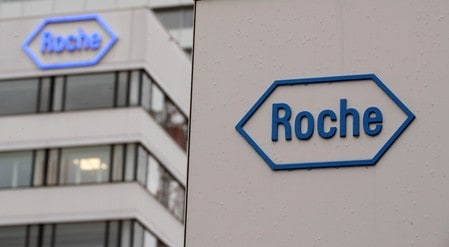ZURICH (Reuters) – Roche’s Tecentriq has won European approval for use against a tough-to-treat breast cancer, helping the Swiss drugmaker to widen use of an immunotherapy that has so far been eclipsed in revenue terms by more-established rival medicines.
The European Commission approved Tecentriq with Abraxane for people with metastatic triple-negative breast cancer that tests positive for a protein believed to help tumors to evade attack by the body’s immune system, Roche said on Thursday.
Tecentriq trailed rival immunotherapies Keytruda and Opdivo – produced by Merck and Bristol-Myers Squibb respectively – to market but has been racking up approvals.
These include approvals for niche indications such as metastatic triple-negative breast cancer. Some 15-20% of breast cancer is triple-negative, meaning tumors lack three characteristics for which there are more treatment options.
“The European approval of this Tecentriq combination represents a significant step forward in the treatment of this aggressive breast cancer, where the unmet medical need is great,” Roche Chief Medical Officer Sandra Horning said in a statement.
Tecentriq, having steadily added approvals in new cancer indications and new geographies, is on track to surpass $1.5 billion in annual sales in 2019, its third full year on the market.
Opdivo and Keytruda, which had a two-year head start on Tecentriq, achieved sales of $6.7 billion and $7.2 billion respectively in 2018.
(Reporting by John Miller; Editing by David Goodman)


